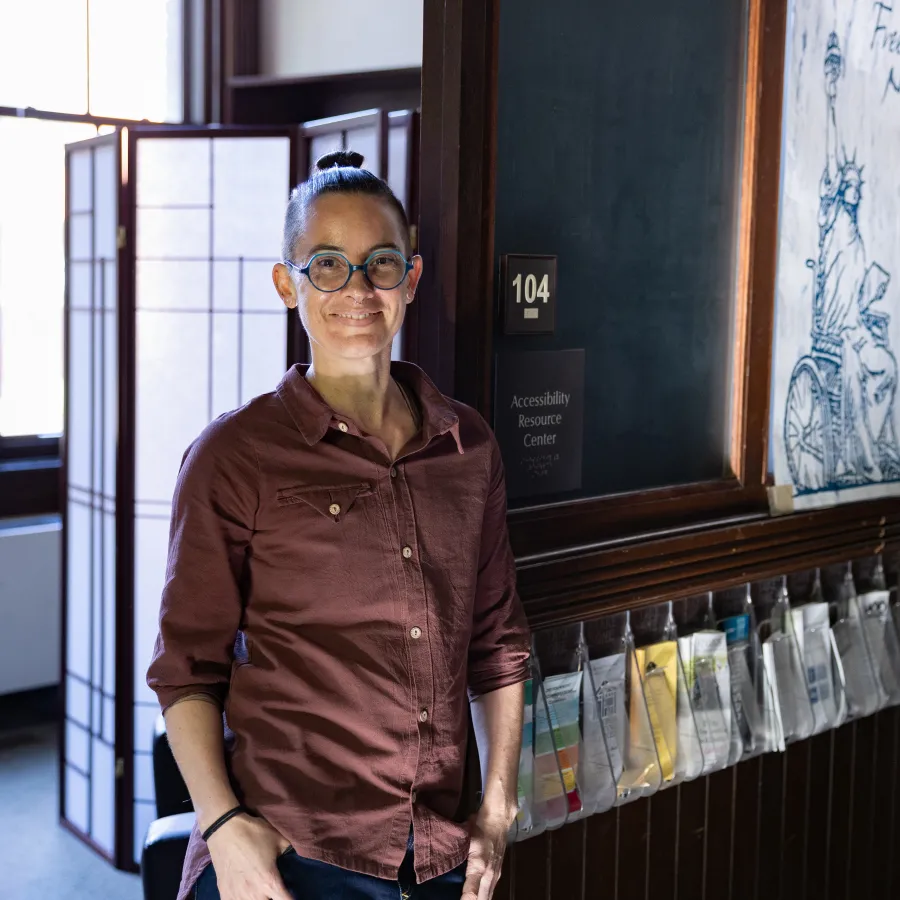No Barriers!
Campus Life
Smith’s Accessibility Resource Center starts the semester with a new name and a renewed focus on disability justice
EJ Seibert ’08, the college’s director of accessibility, outside the newly-renamed Accessibility Resource Center (ARC) in College Hall.
Published August 23, 2024
With new staff and a new name, Smith’s Accessibility Resource Center is strengthening its goal of ensuring that all students can participate fully in the life of the college.
The name change from Office of Disability Services came in response to feedback that not all students in need of accommodations at Smith identify as disabled, says EJ Seibert ’08, the college’s director of accessibility.
In recent years, the percentage of Smith students requesting accommodations for physical, learning, and other disabilities has grown rapidly, from 9% in 2008 to 39% in 2023—an increase other colleges are experiencing, as well. The rise is due to a complex combination of factors, Seibert says, including changes in legal and cultural definitions of disability, and a nationwide increase in diagnosed mental health conditions.
Those trends—which began before the pandemic but were exacerbated by the lockdown—“speak to a greater need to redesign the larger education system and incorporate more principles of universal and co-design,” says Seibert, referring to the concept of making environments and systems inclusive for people of all abilities. Following those principles “helps decrease the volume of accommodation requests by being inclusive from the start,” Seibert adds, “since those requests are, in essence, requests to be fully included.”
At Smith, the campus community is engaged in ongoing conversation about updating facilities so they are more accessible, Seibert notes. Community members are also creating and utilizing accessibility library guides and more faculty are considering ways to build flexibility into their course design.
Here’s what Seibert had to say about the work of the resource center.
What was the impetus for changing the name of your office?
“It was an issue that arose early in strategic planning focus groups we held in 2022 and 2023. We asked everyone, ‘What do you think the office should be called?’ Students felt the most strongly about a name change. Many said they didn’t come in to ask for help because they don’t see themselves as disabled—or disabled enough. There are varying levels of stigma around the word ‘disability,’ which also connects to the conversation regarding intersecting identities and what the language means to various community members. We pooled all the suggestions people gave us and looked at names used by other institutions. The majority had access or accessibility in the title. And Accessibility Resource Center has such a great acronym [ARC]!”
It’s not just a name change, though, right?
“I love this question! We are shifting the name of our office and keeping our focus on disability justice. People might not connect right away to that term, but some will really come to embrace it over time. It means we have a stronger focus on intersectionality and we’re building onto our mission in a different way. We will meet with students even if they don’t have all the documentation [needed for learning accommodations]. The message is, ‘you can still talk to us!’ We don’t want there to be barriers.”
How is your office responding to the significant rise in requests for assistance over the past few years?
“There are a lot more students and more requests. About half of our students [requesting accommodations] have a primary disability related to mental health. We collaborate closely with the Schacht Center for Health and Wellness, Smith’s tutoring center, and the Office for Equity and Inclusion. We’re working with Dis-Organizing [a student-led advocacy and support group] and the faculty/staff disability affinity group. Our office has also just hired another staff member, a data specialist who will help us transition to a new system that will provide us with more detailed reports and tracking of student requests. In addition to the campus Disability Access Inclusion Committee (DAIC), we’re talking about having a quarterly working group on accessibility and providing more supports for faculty.”
How is your office working on disability justice?
“We want to incorporate more universal design and co-design principles at Smith—actually engaging people who are here in this work. We see that as an ongoing conversation. It would be amazing at some point for the college to do a disability justice strategic plan above and beyond the scope of our center. Another dream would be to revive the position of senior policy adviser on disability access and inclusion that had been occupied by Laura Rauscher [a longtime Smith administrator who passed away in 2023]. We also used to have a robust peer support program that we want to revive.”
What are you most excited about as we move into a new semester?
“I’m really excited about preparing for our new database and reengaging with new and returning students.”
